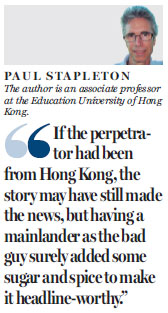Biased media reinforce negative stereotypes of mainland people
Updated: 2016-08-05 07:56
By Paul Stapleton(HK Edition)
|
|||||||
One of the more prominent stories in the news last week was about a mainland woman who tossed orange juice on a Cathay Pacific flight attendant. It appears that the woman was unhappy because a requested meal for her child was not available, and in a rage she threw the liquid at the attendant. Upon arrival in Hong Kong, she was arrested and taken into custody by several police officers. Unsurprisingly, no one was hurt and there was never any question about the flight being put in danger.
Normally, in an era of "if it bleeds it leads" reporting, one would not expect such a story to make it into the media, let alone the headlines. However, these are not normal times. Almost everyone will recall how last year a Korean Air vice-president in a first class cabin threw a tantrum when her macadamia nuts were served in a package rather than on a plate. Later she was given a one-year prison sentence for obstructing aviation safety, while the world's media covered the story in detail.
The public's hunger for human interest stories, especially those that elicit schadenfreude - or taking pleasure in another's misfortune - have become commonplace. After all, hearing that law enforcement and punishment became involved in both the orange juice and "nut rage" stories gives one a sense of satisfaction that justice is prevailing. But there could also be something else at play here, especially when stories about the bad behavior of mainlanders appear in Hong Kong.
It is noteworthy that in the orange juice incident, the mainland origin of the perpetrator was mentioned. Although it is normal for the media to state where an offender is from, there is a question of whether tossing juice on an airplane is really newsworthy. And herein lies a more intriguing story.

There is a prevailing uneasiness among many Hong Kong people toward mainlanders and this often manifests itself as a negative stereotype, particularly when it comes to public behavior. The result is that whenever a mainlander misbehaves in public, that negative image is reinforced. One notable example in recent memory was when a mainland mother let her toddler relieve himself in public in Hong Kong. A video of the event went viral on the internet creating a media sensation. Much of the criticism at the time focused on the fact that the mother was a mainlander. In essence, the event reinforced the stereotype.
This effect is called the availability heuristic, which is a cognitive shortcut that uses immediately available examples to support pre-existing beliefs. In the case of the orange juice toss, the belief is a negative stereotype of mainlanders' behavior. In the meantime, examples that run contrary to beliefs are either ignored or forgotten. When a mainlander makes a positive contribution to Hong Kong society, their mainland status is not the main story. Likewise, when a local family abuses a maid, the bad behavior falls into a different category. It is simply bad behavior.
The media, of course, are acutely aware of their audience's beliefs, and is a complicit partner. In one sense, the tossing of orange juice on the flight attendant gives the media a two-for-one gift. Not only does it apply as a human interest story, but by highlighting the fact that the perpetrator is a mainlander, it can also be framed in a way that dovetails with the stereotype held by the media's audience. If the perpetrator had been from Hong Kong, the story may have still made the news, but having a mainlander as the bad guy surely added some sugar and spice to make it headline-worthy.
The problem with this scenario is that it ignores certain statistical realities. Just for example, the mainland woman who tossed the orange juice at the flight attendant was probably one of the roughly 45 million mainlanders who will visit Hong Kong this year. That figure represents about three-quarters of all visitors to Hong Kong. All things being equal, when visitors behave badly, three out of four times they are likely to be mainlanders.
However, it is unusual for the average reader to think statistically and consider the base rate, which in this case is a staggering number like 45 million, or a large fraction such as three-quarters of a certain population. Instead, human interest stories with a touch of schadenfreude, coupled with a theme reinforcing a stereotype, can carry as much headline-making news as a terror attack.
The cold, hard statistics, however, tell a completely different story. The reality is, when considering the huge number of mainland visitors, it is actually surprising that there are so few incidents of badly behaving individuals that reach the public's attention. However, a story about well-behaved tourists, of any origin, is neither eye-catching nor headline-making.
(HK Edition 08/05/2016 page9)